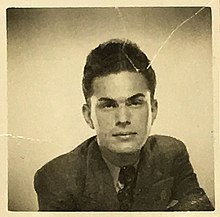Horst-Siegfried Weigmann

Horst-Siegfried Weigmann (born June 10, 1920 in Bad Elster , † January 8 or January 9, 1944 in Dresden ) tried to free his mother from Gestapo detention and lost his life.
Life
Horst-Siegfried Weigmann left the Wehrmacht as a corporal and studied chemistry in Dresden. According to the definition of the First Ordinance on the Reich Citizenship Act of November 14, 1935 , he was a first-degree Jewish half-breed . He lived with his mother Toni Weigmann, who was Jewish according to the Nazi definition.
On January 8, 1944, the Gestapo arrested Toni Weigmann and took her to the police headquarters in Dresden. From there she was supposed to be deported to a concentration camp. At that time, the SS man Henry Schmidt, as a Gestapo functionary in Dresden, was responsible for the deportations of the Jews.
Horst-Siegfried Weigmann made a stamp out of sheet metal, similar to those used by the Gestapo. With that he rushed to the police headquarters and pretended to be Henry Schmidt of the Gestapo. Horst-Siegfried Weigmann asked for Toni Weigmann to be released in order to flee with her.
Confused about the process, the porter called the real Henry Schmidt. He immediately appeared at the police headquarters and exposed Horst-Siegfried Weigmann, who had already reached the exit of the police headquarters with his mother, as a liar. The next morning Horst-Siegfried Weigmann was dead. Toni Weigmann survived the Theresienstadt concentration camp and wrote down her memories of the attempt to escape in autumn 1945.
Honors and reception
- Commemorative event on November 9, 2017 in the Dresden Jewish Community
- Students from Dresden design a station on the “Path of Remembrance” on November 8, 2009 in front of the Dresden Police Headquarters.
literature
- Horst Busse and Udo Krause: Life sentence for the Gestapo commissioner . State publishing house of the German Democratic Republic, Berlin 1989, ISBN 3-329-00590-4 .
- Thomas Gärtner: Courage of Despair. Learning from an ethical dilemma. Project in memory of Horst Weigmann . In: Dresdner Latest News . No. 257, 4th / 5th November 2017.
- Karin Grossmann: Can the son save the mother? In: Saxon newspaper . January 26, 2017.
- Beate Diederichs: A story with great learning potential . In: Dresden University Journal . No. May 10 , 29, 2018 ( online [accessed March 17, 2019]).
- Victor Klemperer : Heroic Köpenickiade . In: I want to bear witness to the last. Diaries 1942–1945. Aufbau-Verlag GmbH, Berlin 1995, p. 477 f. ( Excerpt from text ).
documentary
- Mr. Schmidt from the Gestapo - film documentation of a civil servant career. Director: Róza Berger-Fiedler, 107 min., DEFA studio for documentary films, 1989
Web links
- Excerpt (edited) from the handwritten report by Toni Weigmann about the events of 8./9. January 1945
- Comic representation of the story of Horst Weigmann as a video
- Instructions for schools for dilemma discussion
Individual evidence
- ↑ Book of Memory. Jews in Dresden: deported, murdered, missing. Working group commemorative book of the Society for Christian-Jewish Cooperation Dresden eV (editor), 2006, ISBN 3939888141 , ISBN 978-3939888147 , p. 377
- ↑ a b Excerpt (edited) from the handwritten report by Toni Weigmann about the events of 8./9. January 1945
- ^ Obituary in the Dresdner Zeitung from January 19, 1944
- ↑ Horst Busse and Udo Krause: Life sentence for the Gestapo commissioner. State publishing house of the German Democratic Republic, Berlin 1989, ISBN 3-329-00590-4 , p. 55
- ^ Toni Cäcilie Weigmann in the Lexicon of Persecuted Musicians of the Nazi Era (LexM), as of October 4, 2017
| personal data | |
|---|---|
| SURNAME | Weigmann, Horst-Siegfried |
| ALTERNATIVE NAMES | Weigmann, Horst |
| BRIEF DESCRIPTION | German man who died trying to save his Jewish mother |
| DATE OF BIRTH | June 10, 1920 |
| PLACE OF BIRTH | Bad Elster , Germany |
| DATE OF DEATH | January 8, 1944 or January 9, 1944 |
| Place of death | Dresden , Germany |
